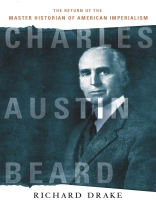Richard Drake presents a new interpretation of Charles Austin Beard’s life and work. The foremost American historian and a leading public intellectual in the first half of the twentieth century, Beard participated actively in the debates about American politics and foreign policy surrounding the two world wars. In a radical change of critical focus, Charles Austin Beard places the European dimension of Beard’s thought at the center, correcting previous biographers’ oversights and presenting a far more nuanced appreciation for Beard’s life.
Drake analyzes the stages of Beard’s development as a historian and critic: his role as an intellectual leader in the Progressive movement, the support that he gave to the cause of American intervention in World War I, and his subsequent revisionist repudiation of Wilsonian ideals and embrace of non-interventionism in the lead-up to World War II. Charles Austin Beard shows that, as Americans tally the ruinous costs—both financial and moral—of nation-building and informal empire, the life and work of this prophet of history merit a thorough reexamination.
Зміст
Preface
Acknowledgments
Introduction: The Beardian Interpretation of American History
1. Discovering the Economic Taproot of Imperialism
2. Two Contrasting Progressive Views of the Great War
3. Becoming a Revisionist
4. Washington and Wall Street Working Together for War
5. Isolationism versus Internationalism
6. A Wartime Trilogy
7. Waging War for the Four Freedoms
8. Beard Finds an Ally in Herbert Hoover
9. Attacking ‘the Saint’
10. Defending Beard after the Fall
11. Beard’s Philosophy of History and American Imperialism
Conclusion: The Sad Historian of the Pensive Plain
Notes
Index
Про автора
Richard Drake is the Lucile Speer Research Chair in Politics and History at the University of Montana. He has published several books, including The Education of an Anti-Imperialist.












